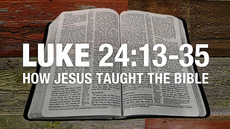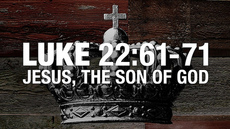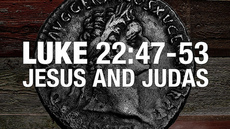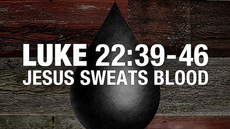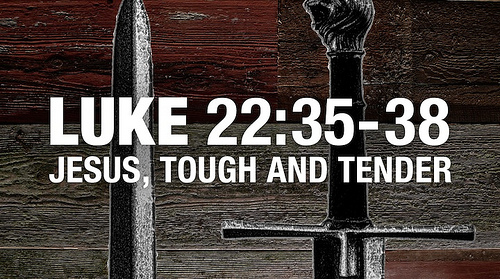 From the Oct. 2 sermon, "Jesus, Tough and Tender," preached by Pastor Mark out of Luke 22:35–38:
From the Oct. 2 sermon, "Jesus, Tough and Tender," preached by Pastor Mark out of Luke 22:35–38:
On his way to the cross, the Scriptures give Jesus confidence, courage, and clarity. When life gets hard, go to the book that God wrote. God wants us to receive and consider the whole book (or tota sola Scriptura), and wants us to connect all of Scripture to Jesus. Jesus himself does this when he recalls Isaiah 52–53—written 700 years before his birth—and shows how it promised his coming, his death on the cross, and his resurrection to make enemies friends.
Well, which is it, Jesus? Pack supplies or don’t pack supplies? Be ready or don’t be ready? Wear shoes or don’t wear shoes? Pack a weapon or don’t pack a weapon? Which is it? And it all depends on the mission. It depends on what you’re being sent to do. He says, "On this mission, take nothing; on this mission, take everything." Now, if we only had this verse, and we didn’t practice tota sola Scriptura, you would say, "How do you know they’re Christians?" "Well, because they had pockets full of money, had a backpack full of supplies, and they’re always carrying firearms. That’s how we know who the Christians are, right? Because Jesus said get a weapon, pack a backpack, and bring some cash." Right? Well, which is it? Again, tota sola Scriptura. Look at what the whole Bible says. The truth is, sometimes you should raise money. Sometimes you shouldn’t. Sometimes you should pack supplies. Sometimes you shouldn’t. Sometimes you should defend yourself. Sometimes you shouldn’t. It all depends on the mission. So, you’ve got to consider what Jesus is calling you to in that moment, in that moment.
Mars Hill, the book is about Jesus, and all the people, and all the stories, and all the principles are ultimately part of the subplot connecting to the storyline that we are sinners, and Jesus comes as our Savior. And the book doesn’t make any sense unless it’s all connected to Jesus. This is exactly what Jesus repeatedly, emphatically, and clearly taught. We’ve seen it earlier in Luke. We’ll see it at the end of Luke, and we see it again today in Luke 22:37. Here, Jesus quotes Isaiah 53:12. Here’s what he says. "For I tell you that this Scripture—" we’re back to the book that God wrote— "must be fulfilled in me: ‘And he was numbered with the transgressors.’" That’s a quote of Isaiah 53:12. "For what is written about me has its fulfillment." What is Jesus saying? "This whole book is now being fulfilled in my life. I am here fulfilling everything that is written in the book that God wrote." Jesus is on the precipice, again, of his crucifixion, of his death, his burial, his resurrection, and he knows this is all according to plan. This is all according to Scripture. This is all in the fulfillment of the eternal plan of God that is now working itself out in history. That’s exactly what he says. And he quotes Isaiah 53:12. Jesus is on his way to his death, and what he has in his mind is Scripture. This is so practically helpful for us, to know the Word of God, to trust the Word of God, to memorize the Word of God so that we can recall it in seasons of testing and suffering.
The Bible uses this word "for" a lot to tell us that Jesus came and served us by suffering and dying, and he did it all for us. He never sinned, and we’ve all sinned, and he suffered as our substitute, paying the penalty for sin, which is death. You can read it for yourself. Isaiah 53:5, "He was wounded for our transgressions; he was crushed for our iniquities; upon him was the chastisement that brought us peace, and with his stripes we are healed." This is the great exchange. This is substitution. In the garden, human beings substituted themselves for God, and on the cross God substituted himself for us, and he suffered and died in our place for our sins, as our substitute, our servant, and our Savior. That’s the Son of God. That’s the Lord Jesus Christ. Jesus never sinned, and Jesus died for my sin. The death he died is the death I deserve, and he did that for me.Next week, Luke #93, "Jesus Sweats Blood."
